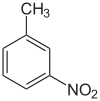3-Nitrotoluene
3-Nitrotoluene or meta-nitrotoluene is a yellow liquid. It is used in the manufacture of meta-toluidine. It is an intermediate in the production of various dyes.[3]
 | |
| Names | |
|---|---|
| IUPAC name
1-Methyl-3-nitro-benzene | |
| Other names
m-Nitrotoluene | |
| Identifiers | |
3D model (JSmol) |
|
| ChEBI | |
| ChemSpider | |
| ECHA InfoCard | 100.002.480 |
PubChem CID |
|
| UNII | |
CompTox Dashboard (EPA) |
|
| |
| |
| Properties | |
| C7H7NO2 | |
| Molar mass | 137.138 g·mol−1 |
| Appearance | yellow liquid[1] |
| Odor | mild, aromatic[1] |
| Density | 1.1581 g·cm−3 @ 20°C [2] |
| Melting point | 15.5 °C (59.9 °F; 288.6 K)[2] |
| Boiling point | 232 °C (450 °F; 505 K)[2] |
| 0.05% (20°C)[1] | |
| Vapor pressure | 0.1 mmHg (20°C)[1] |
| -72.71·10−6 cm3/mol | |
| Hazards | |
| Flash point | 106 °C; 223 °F; 379 K [1] |
| Explosive limits | 1.6%-?[1] |
| NIOSH (US health exposure limits): | |
PEL (Permissible) |
TWA 5 ppm (30 mg/m3) [skin][1] |
REL (Recommended) |
TWA 2 ppm (11 mg/m3) [skin][1] |
IDLH (Immediate danger) |
200 ppm[1] |
Except where otherwise noted, data are given for materials in their standard state (at 25 °C [77 °F], 100 kPa). | |
| Infobox references | |
Synthesis and reactions
It is made by nitrating toluene. This reaction mainly affords a 2:1 mixture of 2-nitro and 4-nitro isomers, but after removal of the 2-isomer, the 3-nitrotoluene can be purified by distillation. It is a precursor to toluidine, which is used in producing azo dyes.[3]
gollark: > rust is nowhere near being better than CAt least it actually has safety, working dependency management, and a good type system.
gollark: Except possibly images.
gollark: Your website should *not*, as a general rule, pull in more than 1MB of stuff.
gollark: Yees.
gollark: It actually used to have green threads like Go, fun fact.
References
- NIOSH Pocket Guide to Chemical Hazards. "#0463". National Institute for Occupational Safety and Health (NIOSH).
- Lide DR, ed. (2004). CRC handbook of chemistry and physics: a ready-reference book of chemical and physical data (85 ed.). Boca Ratan Florida: CRC Press. ISBN 0-8493-0485-7.
- Gerald Booth (2007). "Nitro Compounds, Aromatic". Ullmann's Encyclopedia of Industrial Chemistry. Weinheim: Wiley-VCH. doi:10.1002/14356007.a17_411.
This article is issued from Wikipedia. The text is licensed under Creative Commons - Attribution - Sharealike. Additional terms may apply for the media files.